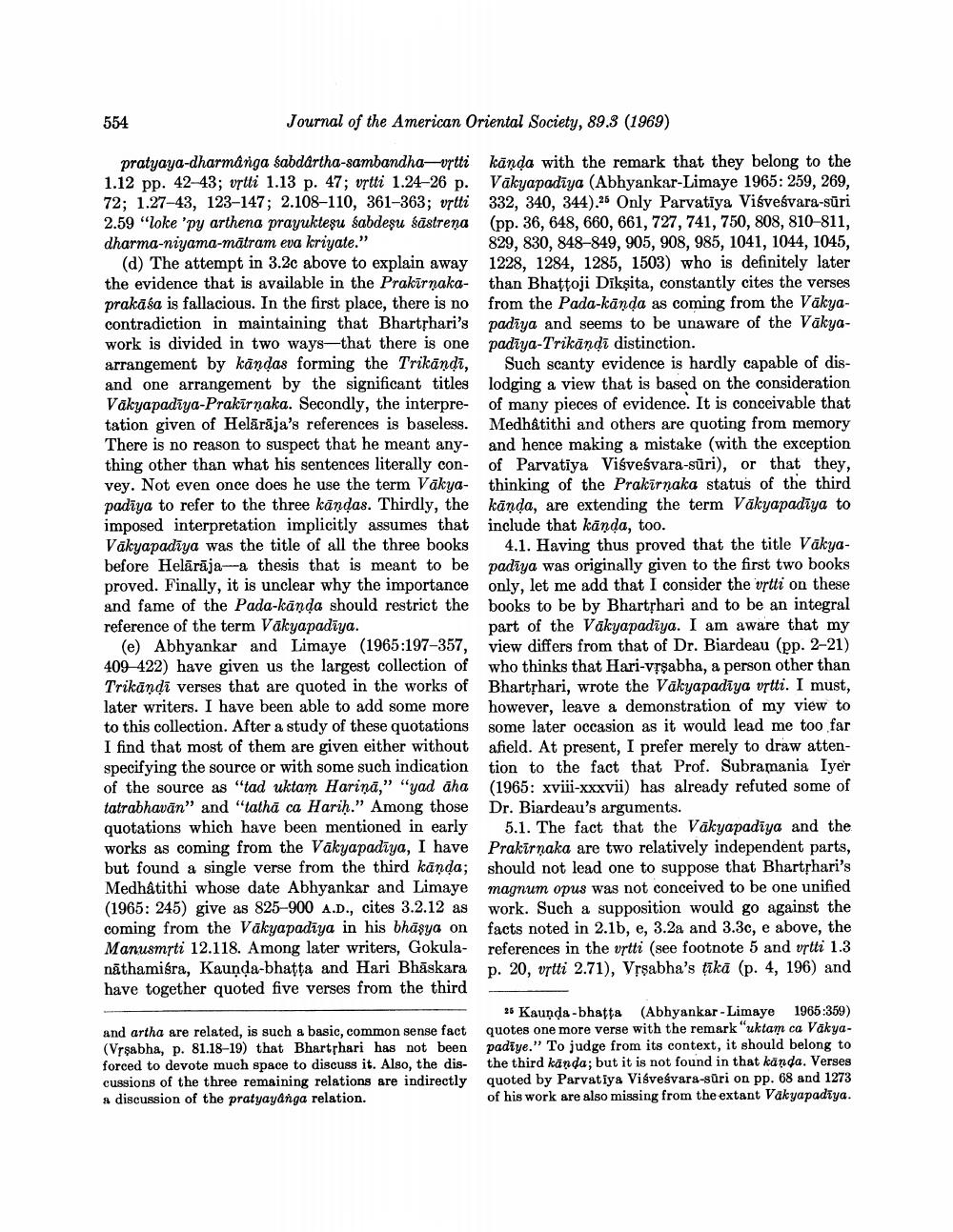Book Title: Two Textual Studies Of Bhartrhari Author(s): Ashok Aklujkar Publisher: Ashok Aklujkar View full book textPage 8
________________ 554 Journal of the American Oriental Society, 89.3 (1969) pratyaya-dharmånga sabdartha-sambandha-vrtti kanda with the remark that they belong to the 1.12 pp. 42-43; vrtti 1.13 p. 47; vrtti 1.24-26 p. Vakyapadiya (Abhyankar-Limaye 1965: 259, 269, 72: 1.27-43, 123-147; 2.108-110, 361-363; vrtti 332, 340, 344).25 Only Parvatiya Visvešvara-sūri 2.59 "loke 'py arthena prayuktesu sabdesu śāstrena (pp. 36, 648, 660, 661, 727, 741, 750, 808, 810-811, dharma-niyama-mātram eva kriyate." 829, 830, 848-849, 905, 908, 985, 1041, 1044, 1045, (d) The attempt in 3.2c above to explain away 1228, 1284, 1285, 1503) who is definitely later the evidence that is available in the Prakīrnaka- than Bhattoji Dikşita, constantly cites the verses prakāśa is fallacious. In the first place, there is no from the Pada-kānda as coming from the Vākyacontradiction in maintaining that Bharthari's padiya and seems to be unaware of the Vakyawork is divided in two ways—that there is one padīya-Trikāndī distinction. arrangement by kändas forming the Trikāndi, Such scanty evidence is hardly capable of disand one arrangement by the significant titles lodging a view that is based on the consideration Vakyapadīya-Prakīrnaka. Secondly, the interpre- of many pieces of evidence. It is conceivable that tation given of Helārāja's references is baseless. Medhâtithi and others are quoting from memory There is no reason to suspect that he meant any- and hence making a mistake (with the exception thing other than what his sentences literally con- of Parvatiya Visvesvara-süri), or that they, vey. Not even once does he use the term Vākya- thinking of the Prakīrņaka status of the third padīya to refer to the three kõndas. Thirdly, the kānda, are extending the term Vākyapadīya to imposed interpretation implicitly assumes that include that kända, too. Vākyapadīya was the title of all the three books 4 .1. Having thus proved that the title Vākyabefore Helārāja---a thesis that is meant to be padīya was originally given to the first two books proved. Finally, it is unclear why the importance only, let me add that I consider the vrtti on these and fame of the Pada-kända should restrict the books to be by Bharthari and to be an integral reference of the term Vākyapadīya. part of the Vakyapadīya. I am aware that my (e) Abhyankar and Limaye (1965:197-357, view differs from that of Dr. Biardeau (pp. 2-21) 409 422) have given us the largest collection of who thinks that Hari-vşşabha, a person other than Trikāndi verses that are quoted in the works of BhartȚhari, wrote the Vākyapadīya vrtti. I must, later writers. I have been able to add some more however, leave a demonstration of my view to to this collection. After a study of these quotations some later occasion as it would lead me too far I find that most of them are given either without afield. At present, I prefer merely to draw attenspecifying the source or with some such indication tion to the fact that Prof. Subramania Iyer of the source as "tad uktam Harinā," "yad āha (1965: xviii-xxxvii) has already refuted some of tatrabhavān" and "tathā ca Harih." Among those Dr. Biardeau's arguments. quotations which have been mentioned in early 5.1. The fact that the Vakyapadiya and the works as coming from the Vākyapadīya, I have Prakirnaka are two relatively independent parts, but found a single verse from the third kāņda; should not lead one to suppose that Bhartphari's Medhâtithi whose date Abhyankar and Limaye magnum opus was not conceived to be one unified (1965: 245) give as 825-900 A.D., cites 3.2.12 as work. Such a supposition would go against the coming from the Vakyapadiya in his bhāşya on facts noted in 2.1b, e, 3.2a and 3.3c, e above, the Manusmrti 12.118. Among later writers, Gokula- references in the vrtti (see footnote 5 and vrtti 1.3 nāthamiśra, Kaunda-bhatta and Hari Bhāskara p. 20, vrtti 2.71), Vrşabha's tīkā (p. 4, 196) and have together quoted five verses from the third 25 Kaunda-bhatta (Abhyankar - Limaye 1965:359) and artha are related, is such a basic, common sense fact quotes one more verse with the remark "uktam ca Vakya(Vrsabha, p. 81.18-19) that Bhartshari has not been padīye." To judge from its context, it should belong to forced to devote much space to discuss it. Also, the dis- the third kanda; but it is not found in that kanda. Verses cussions of the three remaining relations are indirectly quoted by Parvatiya Visvesvara-sūri on pp. 68 and 1273 s discussion of the pratyayanga relation. of his work are also missing from the extant Vakyapadīya.Page Navigation
1 ... 6 7 8 9 10 11 12 13 14 15 16 17
